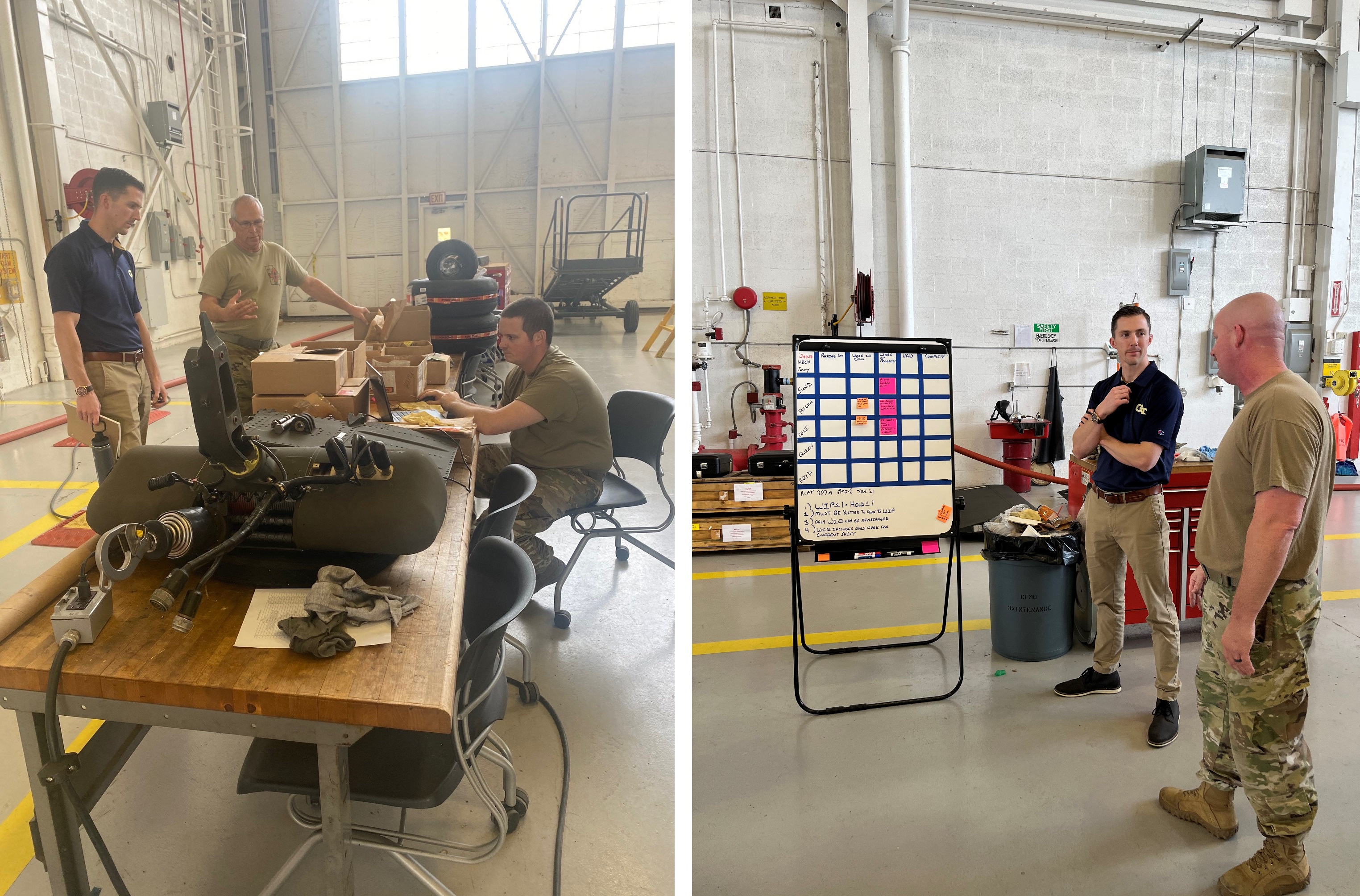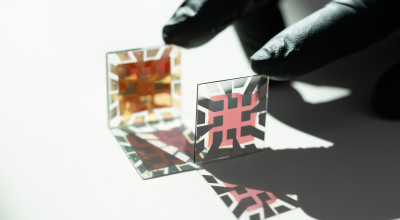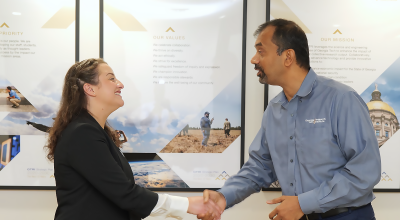
The Georgia Tech Research Institute (GTRI) is renowned for its exceptional problem-solving capability, specifically in the realm of national defense. GTRI endeavors to dissect intricate defense problems and deliver viable solutions. One group at GTRI that has particularly embraced this challenge is the Strategic Sustainment Team (SST), which brings GTRI's brand of innovation and problem-solving to the Department of Defense's (DoD) maintenance and logistics operations.
The SST's mission is to: "Make GTRI the thought leader in developing future aircraft sustainment, lifecycle management, and logistics best practices." SST strives to achieve this through business intelligence produced through benchmarking leading operators, integrating technologies, developing enterprise innovation solutions, and fostering organizational change management.”
The Founding Vision
The team's ultimate goal is to enact change that will significantly benefit sponsors.
In 2018, Dr. William Roper, then Assistant Secretary of the Air Force for Acquisitions, Technology, and Logistics, saw exceptional performance at Delta Air Lines, and wanted to inject this performance into the Air Force. He connected with Air Force’s Education with Industry (EWI) Fellows embedded in Delta Airlines and Amazon, who had developed a proposal for what has since become known as the Tesseract Office of Innovation. Roper is a Georgia Tech alum (PHYS '01, '02) and a distinguished professor of the practice in GT's Sam Nunn School of International Affairs.
Major General Linda S. Hurry, the Director of Logistics and Deputy Chief of Staff for Logistics, Engineering and Force Protection, Headquarters US Air Force, expanded upon their idea and built the new office to focus on challenges within the Air Force’s maintenance and logistics communities. Specifically, she wanted them to build a network of academic and industry partners combined with liaison officers throughout the enterprise to execute on six lines of effort laid out in the Air Force's Sustainment Strategic Framework (SSF).
GTRI's SST and Delta Air Lines were inaugural members of this network and have worked to support Tesseract with SSF implementation, foster collaboration, and applying innovation, empowering ideas to accelerate change.
"We do a lot of this analysis as if we're doing it by ourselves. We cannot do this alone, and our partners have a lot of capacity and capability," stated General Charles Q. Brown Jr., the Chief of Staff at the Air Force, emphasizing the value of this collaboration.
GTRI Builds Upon the Vision
SST receives contributions from and a wide-reaching group of GTRI collaborators, including students. Every member contributes using their own source of knowledge and skills and achievements.
One of the GTRI SST’s founders is senior research engineer and U.S. Marine Corps reservist, Kyle Blond, who was pivotal in the team's development. Blond helped set a vision for SST that extends beyond simply improving isolated aspects of maintenance and logistics. He aims for the SST to be a catalyst for sweeping transformation within the DoD.
As Blond explains, "Our vision here is to advance academic, industry, and government collaborations to deliver transformational change for sustainment stakeholders through innovation and experimentation." He emphasizes that the team's focus on innovation is not merely about doing things better, but about fundamentally changing how things are done.
Blond's own experience played a significant role in shaping this vision. As a Marine Aircraft Maintenance officer and aerospace engineering graduate from Georgia Tech, Blond brings to the table a wealth of military and academic expertise. This is complemented by the various experiences of his team members, which include an Air Force aircraft maintenance officer and a former Delta Airlines general manager for maintenance planning. The combination of these experiences provides a unique perspective and an enormous amount of transfer learning, which has proven crucial to the success of SST.
“SST doesn't work from desks,” says Eric Klein, a Senior Research Associate in GTRI’s Electronic Systems Laboratory (ELSYS), and a member of SST.
A significant aspect of the SST's work is its hands-on approach. Rather than merely conducting analyses from behind desks, SST is directly involved in the innovation process. Blond describes this balance between research and development: "Our team balances research and development here in Atlanta while also going to various customer locations to design and drive these experiments to fruition."
SST's collaborative work extends far beyond the walls of GTRI. The team is deeply involved with a wide network of partners and contributors, including hundreds of volunteers from academia, government, and commercial organizations. This network has been instrumental in fostering a culture of innovation and building an ecosystem of problem solvers.
“GTRI's SST is made up of members with deep military and commercial maintenance experience, along with senior research personnel specializing in data analytics, optimization, and predictive maintenance approaches,” said Klein. “We are also receiving contributions from students and a wide-reaching group of GTRI collaborators. Every member contributes using their own source of knowledge and skills and achievements. Because of this, the GTRI Strategic Sustainment Team has what it takes to ‘win.’”
In addition to its involvement with academic and government organizations, SST has been making strides in the commercial sector as well. Blond said, "There have been talks of co-developing software that both perhaps the Air Force and Delta could benefit from because they face a lot of the same challenges when it comes to fixing and flying aircraft." This is exemplary of SST's commitment to sharing knowledge and driving innovation across sectors, demonstrating that its work is as much about collaboration as it is about leadership.
Anticipating and Leading
With over $10.8 million in sponsored projects under its belt, SST has continually proven its ability to stay ahead of the DoD's needs. Through research in predictive maintenance, enterprise logistics, and operational tracking systems, the SST is pushing boundaries and developing groundbreaking solutions. This proactive approach, Blond explains, is a fundamental aspect of SST's mission: "Our mission is to try to be the thought leader in aircraft maintenance and sustainment innovations."
Some of SST’s projects include the C5 experiment on increasing mission-capable aircraft, the KC-46 analysis on the Air Force organically adopting the Boeing maintenance program, working with the Global Strike command manager on the logistics support Pathfinder to increase mission-capable aircraft and reduce s time using innovative planning and scheduling processes. Another project is Iron Spear, a multi-year research project to develop predictive maintenance models from existing sensors and data on aircraft.
Blond makes it clear that in its mission to become the thought leader in the space, SST not only responds to the challenges at hand but also actively identify areas where the team can innovate and propose new ideas.
"Our approach is proactive," Blond explains, "We don't wait for the problem to become critical before starting our work. We constantly brainstorm and look for opportunities where we can make a difference."
The SST team's efforts have led to numerous partnerships, further amplifying their impact. Notably, the SST has established collaborations with Historically Black Colleges and Universities (HBCUs), broadening the perspectives and experiences that contribute to their work. It has also partnered with the Georgia Tech’s Professional Masters in Applied Systems Engineering (PMASE) program, offering students an opportunity to engage with cutting-edge research and real-world applications of their studies.
SST is engaged with Georgia's economic development organizations, aiming to drive economic growth and innovation within the state. These collaborations allow the SST to harness a broad range of knowledge and expertise, fostering a rich, innovative ecosystem that promotes both local and national advancement.
Blond highlights that the team's success so far is only the beginning, "The ultimate goal is for GTRI to become the thought leader in developing future aircraft sustainment life cycle management and logistics best practices that can be applied for our sponsors' benefit."
He believes that through the SST's work, they can help bring about a transformational change in the defense sector by pushing the boundaries of existing practices and forging new paths in innovation.
The SST is committed to making a lasting impact on the Department of Defense's maintenance and logistics operations. Through its collaborations, proactive approach, and commitment to groundbreaking solutions, the SST is poised to make a lasting mark on the world of defense operations and beyond.
Watch the GTRI Strategic Sustainment Team introductory video here.
Writer: Christopher Weems
Photo: Christopher J. Moore
GTRI Communications
Video: Eric Klein, GTRI Electronic Systems Laboratory (ELSYS)
Georgia Tech Research Institute
Atlanta, Georgia
![]()
The Georgia Tech Research Institute (GTRI) is the nonprofit, applied research division of the Georgia Institute of Technology (Georgia Tech). Founded in 1934 as the Engineering Experiment Station, GTRI has grown to more than 2,900 employees, supporting eight laboratories in over 20 locations around the country and performing more than $800 million of problem-solving research annually for government and industry. GTRI's renowned researchers combine science, engineering, economics, policy, and technical expertise to solve complex problems for the U.S. federal government, state, and industry.



